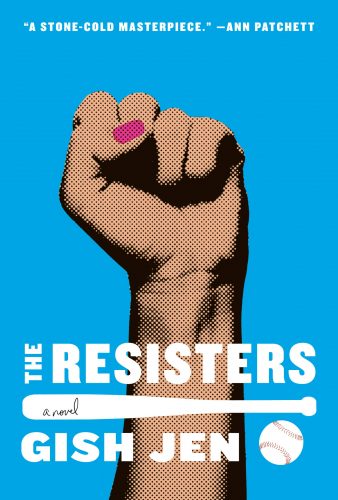Author Interview: Gish Jen on “The Resisters”
By Matt Hanson
Gish Jen’s new novel asks, Is ambition worthwhile in a world without justice?

Given the fantastical levels of cruelty and foolishness coming out of Washington, DC, dystopian fiction is assuming a pragmatic value: it is a way to anticipate (and perhaps ward off) just how bad things are going to get. One of the ironies of today’s politics is that the party that panders best to the classes that desperately need government help does little for them. The divide between the haves and the have-nots is deepening with every election cycle, a distressing fact that makes the warnings served up by apocalyptic fiction more urgent than ever.
Gish Jen’s new novel The Resisters tells the story of a family living in a corporate-saturated America that sounds less fanciful than it should. In “AutoAmerica” pretty much everything is corporatized and commodified: there are few aspects of life not under the insidious sway of an all-seeing and all-encompassing internet, referred to casually as “Aunt Nettie.” Homes are watched over by giant Alexas, which monitor and respond to people’s statements with preprogrammed homilies. Society has been neatly sliced and diced by social, geographical, and topographical forces. Most of the land has been flooded over, due to reasons you can probably guess—people have to row to get from one place to another.
The elite, moneyed class is referred to as The Netted and the rest are labeled The Surplus, who are given basic income but are monitored and scrutinized to gauge their worthiness. In a chilling parallel with the thoroughly profit-oriented “wellness” culture, LifePoints have become the marker of social worthiness. When the daughter of a Surplus couple, Gwen, is born with a prodigious pitching arm, hurling stuffed animals from her crib all the way across the room, her preternatural ability on the baseball diamond—and its assertion of individual aspiration—starts to cause trouble, in terms of what is expected of people of her social standing. Her bookish parents try to protect themselves and others by maintaining a sense of literary tradition. They quote from classic texts of dissent, sentiments that seem to be both more and less relevant given the dark social circumstances. At its core, The Resisters asks if ambition is worthwhile in a world without justice.
The Arts Fuse caught up with Jen on the eve of the novel’s nationwide release to talk about baseball, corporatism, and what can be done about dystopia.
Arts Fuse: Baseball plays a major role in the story. What inspired that?
Gish Jen: Someone in Entertainment Weekly said where I have long had “a feel for sweeping, subversive explorations of American life . . .it feels inevitable” that I would “find [my] way into the dugout.” Of course, where I was the sort of kid who was happily parked in left field, where I just hoped the ball would never be hit in my direction, it felt nowhere near so inevitable to me. However, as I was thinking about how to represent all that might be lost if America continues on its present course, baseball did occur to me as the perfect metaphor.
AF: The all-encompassing corporate saturation (AutoAmerica, Aunt Nettie, PigeonGram, et al.) is disturbing. Were there real-life parallels or was this from speculation? If the former, would you care to share some of the real-life inspirations?
Jen: Do we not live in a world of corporate saturation? I wouldn’t say there was a single real-life inspiration but today you can’t attend the opera, much less a sporting event, without being reminded that corporate America has its fingers in everything. Think of the corporate signs ringing the rink at ice-skating championships, for example. It’s not hard to imagine that in the future, this will continue.
AF: I’d be curious if you could talk a little bit about the uses of dystopian fiction. I don’t mean to pigeonhole the book in genre, but I’m wondering if you have anything you’d like to say about dystopian fiction’s value, its usefulness, and what it can offer that other approaches can’t.
Jen: Like all genres, dystopian fiction has a variety of uses. The one that interests me most is its ability — ironically — to return the human to the foreground. In realistic depictions of our current moment, for example, all that’s happening looms larger than we do. Moreover, we are in endless reaction to it. In a dystopia like mine, the horror has become normal. That’s part of my point, of course, but it also allows more foregrounding of mundane matters like a girl’s struggles with her best friend.
AF: There’s a lot of debate going on right now, in bleak times like these, about the effectiveness of art to actually move the needle socially or politically. Do you have any thoughts on that?
Jen: We can never know if anything we do makes a difference. There are forces at work, too — for example, globalism and populism — of staggering dimensions. Still, art is, as Seamus Heaney once said, steadying. And can anyone accomplish anything while in an unsteady state? I know artists are supposed to be above this sort of thing, but I do hope to hearten a reader or two with my book. And if it’s three or four or five, all the better.
Matt Hanson is a contributing editor at The Arts Fuse whose work has also appeared in The American Interest, The Baffler, The Guardian, The Millions, The New Yorker, The Smart Set, and elsewhere. A longtime resident of Boston, he now lives in New Orleans.
